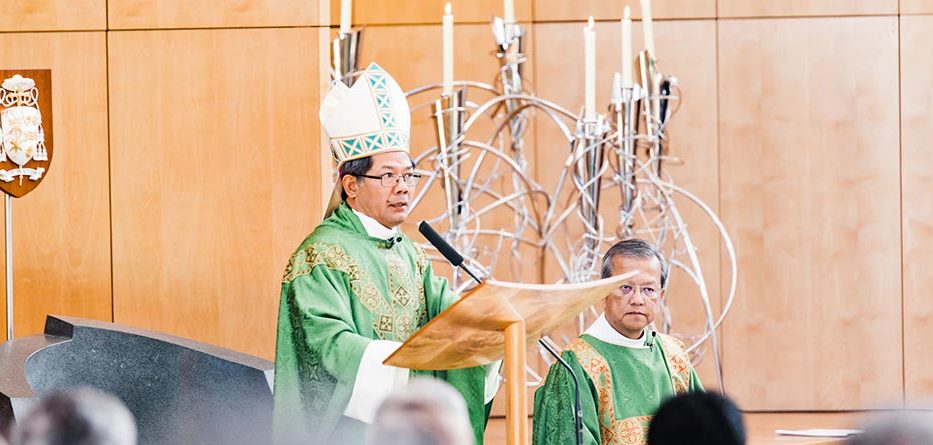Most Reverend Vincent Long Van Nguyen OFM Conv DD STL, Bishop of Parramatta
Homily for the Solemnity of Our Lord Jesus Christ, King of the Universe in Year A 2017 at Christ the King Parish, North Rocks
26 November 2017
Brothers and Sisters,
Today, we celebrate the Feast of Christ the King – which marks the end of our liturgical year. In my childhood days, this feast was observed with much pomp and ceremony. During the time of great tension with the majority Buddhists in Vietnam, the celebration became a rallying cry for Catholics, not unlike the Orange Parade in Belfast. In Northern Ireland, there was a rivalry between Protestants and Catholics. Our tribal rivalry was between Catholics and Buddhists. At one seaside town, the Buddhists built a giant statue of a sleeping Buddha. But we Catholics refused to take it lying down. We built a much bigger statue of Christ on the hill overlooking the ocean. The triumphant King of kings seemed to be looking down on the sleeping Buddha with glee!
However, nothing can be further from the truth than the idea of Jesus being associated with the worldly power and triumphalism. The Gospel is at pains to point out that the way Jesus carried out his mission was fundamentally counter-cultural. He was a king who turned upside down the conventional understanding of kingship. He was a king who rode on the back of the donkey, who mixed with the outcasts and washed the feet of others. From the crib to the cross, instead of being a hero with power, wealth and splendour, Jesus acted more like an anti-hero who defied the popular expectations. He was not a warrior but a peacemaker. He was not a conqueror through domination and violence but a humble servant through non-violence and justice.
The Word of God for this Sunday presents us with this unconventional and uncomfortable notion of Jesus the King. In the first reading, Ezekiel speaks of a new ruler who will be unlike other kings in Israel. These were responsible for the destruction and deportation because of their preoccupation with self-interest, political survival and opportunism. The new ruler, instead, will be like a caring shepherd who will “look for the lost sheep, bring back the stray, bandage the wounded and make the weak strong”.
We can hear echoes of Ezekiel’s prophecy in the way Jesus critiques the ruling elites of his time. He often condemns them for being more concerned about their status and power than integrity, justice and love. For him, the ultimate requirement, the litmus test of authentic leadership has to do with service and especially service rendered with humility to the vulnerable and the outcast.
The Parable of the Judgment makes this litmus test crystal clear. The king does not judge his subjects on any other criteria than their ability to recognise and serve him in their fellow human beings. What surprises both the faithful and the unfaithful is the revelation that God is fully present in the most unlikely kind of people. The parable subverts our idea of who and what constitutes the ideal, the normative and the worthy. The more deserving and qualified of God’s loving embrace turn out to be the ones we often neglect and reject. In Jesus who surrounds himself with the outcast, we see a God of solidarity and vulnerability. In Jesus, we meet a God who disturbs our comfort and pushes us out to the periphery to be with the least of his brothers and sisters.
Like the people in the exile, the church today also needs true shepherds who care for God’s flock scattered, wounded and hurt. The church like Israel of old will have a new future only if its leaders act not with self-interest or even the interest of the institution, but with integrity, justice and compassion. The Royal Commission has highlighted the need for the leaders of the Church to embrace a more Christlike way of shepherding. God’s unconditional love and preferential option for the marginalised must be acted out by our solidarity and servant-leadership at the edges of society.
On this Feast of Christ the King, let us learn from him who immersed himself totally in the coalface realities of pain, suffering and social isolation that many experience. Let us learn to walk in the shoes of our indigenous, asylum seeking, homeless, gay and lesbian brothers and sisters, to name just a few. Jesus constantly went beyond the borders of every kind and affirmed the humanity of all. In so doing, he invites us to step beyond our fears, our tribal confines and to expand the boundaries of our love. It is that precarious existence where the true cost of our discipleship is counted, we dare to accompany the Samaritans of our time, just like Jesus did before us. For the precarious edges of life is where the God of surprises beckons us.
Brothers and sisters,
In this time of collective soul searching and institutional repentance, we must learn to be more Christlike in our identity and mission. We must learn to stand with the least and the last. We must continue to be a Church where all people, especially the most vulnerable can feel welcomed, loved, forgiven and encouraged to live according to the Gospel. And as long as we embody that vision of Church in our practice, we become a lighthouse for the world. Let us pray for the courage to follow Christ’s footsteps in uplifting the downtrodden, in giving hope to the hopeless and in building up God’s kingdom among us.








